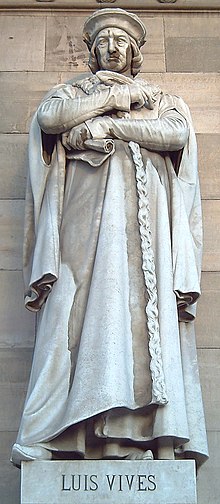Joan Lluís Vives
| Juan Luis Vives | |
|---|---|

Statue of Juan Luis Vives, by Pere Carbonell (1892), placed at the façade of the National Library of Spain
|
|
| Born |
6 March 1493 Valencia, Crown of Aragon |
| Died | 6 May 1540 (aged 47) Bruges, Habsburg Netherlands |
| Era | Renaissance philosophy |
| Region | Western Philosophy |
| School | Renaissance humanism |
|
Main interests
|
psychology, education |
|
Notable ideas
|
Study of the psyche |
| Signature | |
Juan Luis Vives (Latin: Ioannes Lodovicus Vives; Catalan: Joan Lluís Vives i March; Dutch: Jan Ludovicus Vives; 6 March 1493 – 6 May 1540) was a Valencian scholar and humanist who spent most of his adult life in the Southern Netherlands. His beliefs on the soul, insight into early medical practice, and perspective on emotions, memory and learning earned him the title of the "father" of modern psychology. Vives was the first to shed light on some key ideas that established how we perceive psychology today.
Vives was born in Valencia to a family which had converted from Judaism to Christianity. As a child, he saw his father, grandmother and great-grandfather, as well as members of their wider family, executed as Judaizers at the behest of the Spanish Inquisition; his mother was acquitted but died of the plague when he was 15 years old. Shortly thereafter, he left Spain never to return.
While still in Spain, he attended the Valencia Academy, where he was taught by Jerome Amiguetus and Daniel Siso. The school was dominated by scholasticism, with the dialectic and disputation playing a central role in the delivery of education.
Even the youngest scholars are accustomed never to keep silence; they are always asserting vigorously whatever comes uppermost to their minds, lest they should seem to be giving up the dispute. Nor does one disputation, or even two a day prove sufficient, as for instance at dinner. They wrangle at breakfast; they wrangle after breakfast; they wrangle before supper and they wrangle after supper. At home they dispute, out of doors they dispute. They wrangle over their food, in the bath, in the sweating room, in the church, in the town, in the country, in public, in private. At all times they are wrangling.
...
Wikipedia
